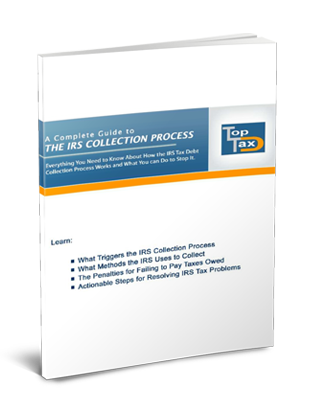If you owe back taxes to the IRS and cannot afford to pay them, you may be eligible to participate in an IRS program known as "Offer in Compromise." Much like a debt settlement program for consumer credit debt, the Offer in Compromise program allows taxpayers to settle their tax debt for much less than they owe.
Why would the IRS allow you to pay them less that you owe in back taxes?
If your tax debt is seriously delinquent, the IRS likely assumes that they will not be able to collect on the debt. This is especially true if you do not have any significant property that they can place a lien or levy on, meaning that the IRS is faced with the choice between continuing to receive nothing, or receiving a small amount of money.

What is an Offer in Compromise?
If you owe the IRS back taxes, but have not yet been contacted by an IRS revenue officer, you may think that your tax delinquency is going unnoticed and you do not have to pay your bill. Nothing can be further from the truth. The IRS can and will make every attempt to collect the debt, including putting a levy or lien on your vehicle, home, or other property. Instead of letting your home become subject to IRS seizure, you can negotiate your bill down through the Offer in Compromise program.
The Offer in Compromise program can help you settle your tax debt for pennies on the dollar. Research has found that program participants typically pay less than 20% of the original amount they owed to the IRS, and the full debt is forgiven upon payment. Instead of living in fear of having the IRS take your car or even your home to satisfy your tax debt, satisfy your debt for less with an Offer in Compromise.
Who is eligible for an Offer in Compromise?
If you can't pay your full tax debt, or paying it would create a serious financial hardship, the IRS will consider your individual circumstances to decide if and how much they'll be willing to accept from you as an offer. They will look at your ability to pay, your income, your expenses, and what assets you own.
You can apply for an Offer in Compromise if you:
- Filed all your required tax returns and made all your required estimated payments
- Aren't in an open bankruptcy proceeding
- Have a valid extension for a current year return (if applying for the current year)
- Are an employer and made tax deposits for the current and past 2 quarters before you apply
What are the steps in the Offer in Compromise process?
First you submit your offer to the IRS. Though the IRS has the ultimate power to accept or reject your offer, you can take steps to increase the chances your Offer in Compromise will be accepted. While they are considering whether to accept your offer, your non-refundable payments and fees are applied to what you owe. You can choose which specific tax year and/or tax debt your payment/fee will be applied to.
During the time before the IRS accepts or rejects your offer, they may file a Notice of Federal Tax Lien, but they will stop all other collection activities until a decision is made. The IRS will also extend the deadlines for collection and legal assessment. However, you will be required to continue to make all required payments, as proposed in your offer. If no decision has been communicated within two years of the IRS getting your offer, then your offer is automatically accepted.
How do I submit an offer?
You can improve your chances of having your Offer in Compromise accepted by making sure you've done everything you need to do to prepare your offer correctly.
When submitting an Offer in Compromise, you'll want to make sure your offer is in line with your reasonable collection potential. This means, you've been fair in estimating what you can actually afford to pay. If the IRS thinks you can afford to pay more than you've offered, they may reject your offer. You can use the same formula the IRS uses to determine your reasonable collection potential.
What are my payment options?
There are essentially two payment options with the Offer in Compromise program: making a lump sum payment or making periodic payments. The way you pay will depend on your offer and the payment option you choose.
If you pay a lump sum of cash, you will need to send an initial payment of 20% of the total amount you're offering with your application. You will receive a written notice that your offer has been accepted (if it is accepted.) Then you will have to pay any remaining amount owed on the offer in five payments or less.
If you opt for the periodic payment option, you'll need to submit your first payment with your application. You will continue to make payments the remaining amount each month, while the IRS is deciding whether to accept your offer. If your offer is accepted, your monthly payments will continue until the offer amount is fully paid off.
What is the acceptance rate?
The rate of acceptance for Offers in Compromise varies by year. However, as a data point, in 2022 the IRS receive 36,022 offers and accepted 13,165 of them. That's an acceptance rate of 36.5%. The chances of acceptance are higher though if you prepare a strong offer that fairly reflects your ability to pay and includes all necessary information and documentation to support your offer. This is where have an experienced tax professional guide you can be beneficial for your case.
What do I do if my offer is rejected?
If your Offer in Compromise is rejected by the IRS, you still have several options to pursue if you feel their decision is incorrect:
-
Appeal the Decision: You can appeal the rejection within 30 days of receiving the rejection letter. You would need to submit a written appeal explaining why you disagree with the rejection and provide any supporting documentation.
-
Request Reconsideration: If there were errors in the rejection decision or if you have new information or circumstances that could affect the decision, you can request reconsideration. This involves contacting the IRS and providing the necessary documentation to support your case.
-
Modify and Resubmit: You can modify your offer and resubmit it for consideration. This could involve adjusting the amount you're offering to pay or providing additional documentation to support your offer.
-
Explore Other Options: If an OIC is not feasible, you can explore other options for resolving your tax debt, such as setting up an installment agreement or requesting currently not collectible status if you're facing financial hardship.
-
Consult with a Tax Professional: It's often beneficial to seek guidance from a tax professionals, like the Top Tax Defenders team, who can review your situation and provide advice on the best course of action.
Remember to act promptly and carefully review the reasons for the rejection to determine the most appropriate next steps.
If you're interested in settling your tax debt for less than you owe through the Offer in Compromise program, having an experienced tax resolution firm to help you navigate the process can help you get the best possible settlement for your situation. Top Tax Defenders has 27 years of experience working with the IRS to help clients find a solution to their tax problems, including negotiating debt down through an Offer in Compromise. We'd be happy to provide a free consultation to see if we can help you.





